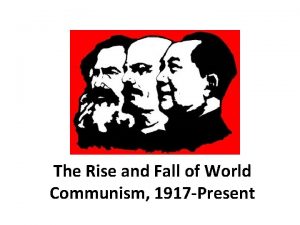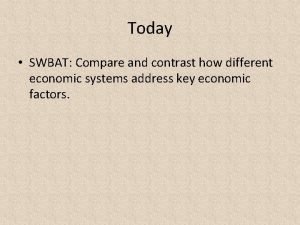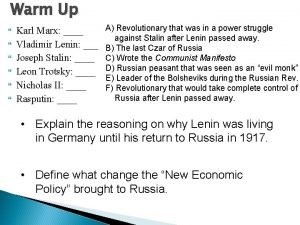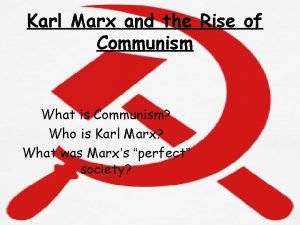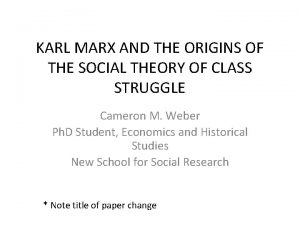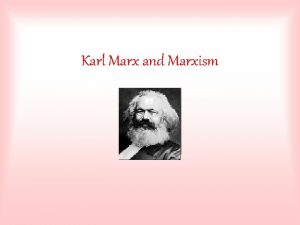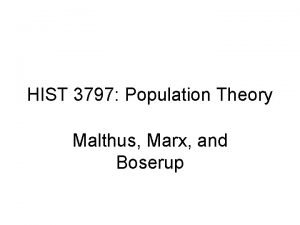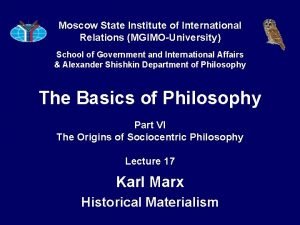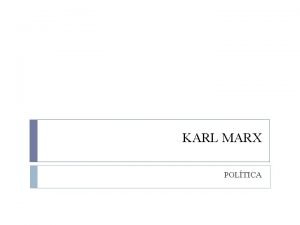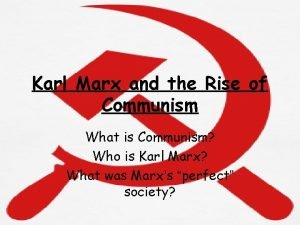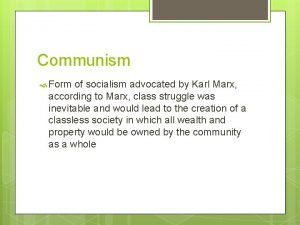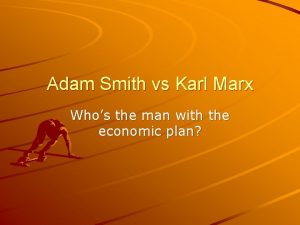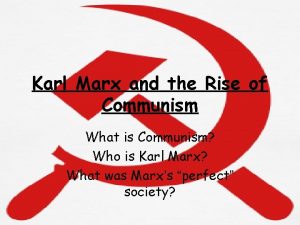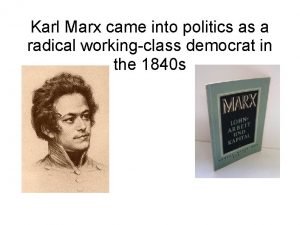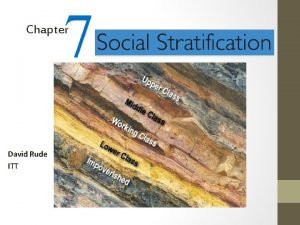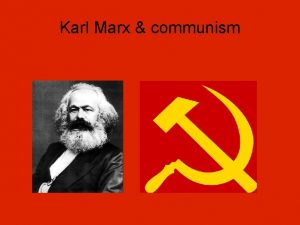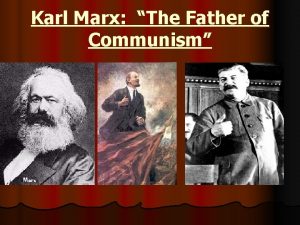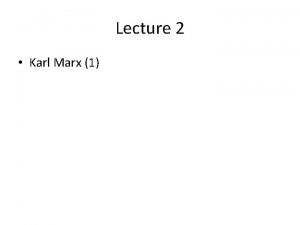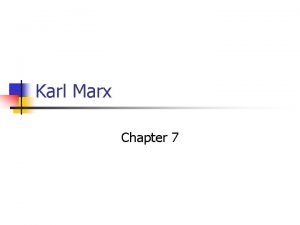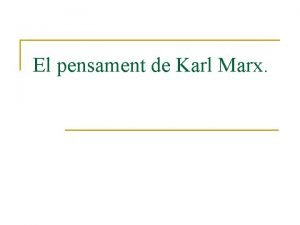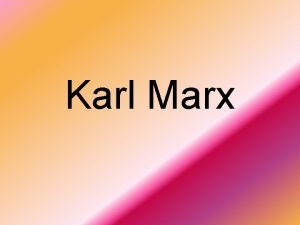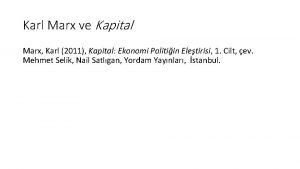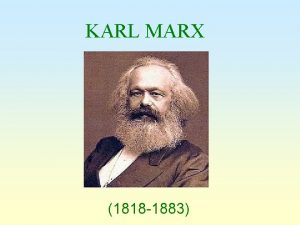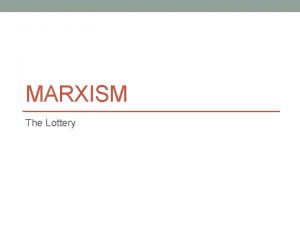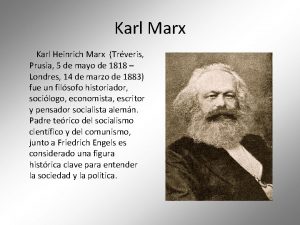Karl Marx and the Rise of Communism What






























- Slides: 30

Karl Marx and the Rise of Communism What is Communism? Who is Karl Marx? What was Marx’s “perfect” society?

Was Marx a Philosopher? • The most illuminating judgment of all is contained in the preface to Capital. Marx here explains as follows: “My dialectical method is not only different from the Hegelian, but is its direct opposite. To Hegel, the lifeprocess of the ‘human brain, that is, the process of thinking, which under the name of ‘the Idea, he even transforms into an independent subject, is the demiurgos of the’ real world, and the real world is only the external, . phenomenal form of the Idea’. With me, on the contrary, the ideal is nothing else than the material world reflected by the human mind, and translated into forms of thought. – Karl Marx • WAS HE A PHILOSOPHER?

What is Marx telling us? • “The Mode of Production in material life determines the general character of the social, political, and spiritual processes of life. It is not the consciousness of men that determine their existence, but on the contrary their social existence that determines their consciousness” –Marx • 1846 Irish Potato Famine kills 20% of Irish population (the Irish potato famine killed a million people, but it killed poor devils only. To the wealthy it did not have the slightest effect. ” – What is his point? How is related to the Role of ideas in Historical Materialism? – “Men eat before they reason” • What does this mean at the most basic or philosophical level?

What is “communism”? • Communism is a philosophy of government / society – Based on the ideals of Marxism / Socialism • Stresses the following: – Classless / stateless society – Common ownership of all resources – No private property – Social equality

Who came up with the basic ideas of Communism? • Karl Marx (1818 – 1883) – German by birth – Former college professor – Author / philosopher • Hated the conditions that the Industrial Revolution had brought to workers – Created “Marxism” = aka “Communism”

Who came up with the idea of Communism? • Frederick Engels (1820 – 1895) – German by birth – College educated – Journalist / Social critic • Had reported on the conditions of working people in Europe during the Industrial Revolution – Financially supported Marx & his writings

How did Marx and Engels meet? • Marx and Engels met in Paris in 1844 – Shared a hatred of current European industrial society – Shared an interest in reform • In the 1850’s both moved to London and lived together – Began collaborating on writings / philosophy

Marx & Engels’ home in the Primrose Hill neighborhood of London. Live here together with their families from 1852 until Marx’s death in 1883

During their close friendship / partnership of over 30 years, Engels and Marx wrote several books and over 1, 500 letters to one another

What is The Communist Manifesto? • The Communist Manifesto was Marx and Engels’ greatest work – Published in 1848 • Not widely read in Europe until after Marx’s death in 1883 – Marxist “Bible”

Who are the major players in Communism? • Two (2) groups: 1. Proletariat = Working class / lower classes of society 2. Bourgeoisie = Upper classes / the ones who gain wealth off the proletariat

Development of the “factory culture”

Stereotype of the Factory Owner

“Upstairs / Downstairs” Life

What is Marx / Engels’ theories? • • Marx and Engels studied the history of the world’s economies and the way that power, industry and finance are controlled. They saw the way countries developed in stages over world history Communism (Marxism) Socialism Capitalism Feudalism Primitive Communism

Karl Marx the Philosopher • Marx was a disciple and critic of Hegel • Materialist Conception of History – What does this mean? • “It’s the economy stupid!” • Human society is made up of two elements – Superstructure = Beliefs, • Thesis Antithesis Synthesis – Change Resistance New Thesis

• Human society is made up of Two Elements: • Superstructure (Ideology) = Religions, Beliefs, Laws – Superstructures maintains (& shapes) the base through modes of thinking • Base (modes of production and relations) = the materials of production – Base shapes (& maintains) the superstructure through materialism (confusing? )

What did Marx think of Capitalism? • Marx is not against Capitalism • Marx considered Capitalism an essential step towards Communism • Marx utilized similar methods to Adam Smith; he just believed Smith’s theories were wrong b/c Smith saw Capitalism as the end result of economic progress • Marx would likely have opposed the Communist Revolutions of Russia & China

So why do ppl think Marx hates Capitalism? • 1). Because Marx certainly believed Capitalism had innate flaws – What are the flaws he points out in the Manifesto? • 2). Because some people believe Marx was against individual rights/liberties – See quote below: • “The Free development of each is a prerequisite of a freedom of all. ” –Karl Marx in The Communist Manifesto

Quote from Dr. Terry Eagleton • “This is not to suggest for a moment that Marx considered capitalism as simply a Bad Thing, like admiring Sarah Palin or blowing tobacco smoke in your children's faces. On the contrary, he (Marx) was extravagant in his praise for (Capitalism and) the class that created it, a fact that both his critics and his disciples have conveniently suppressed. No other social system in history, he wrote, had proved so revolutionary. In a mere handful of centuries, the capitalist middle classes had erased almost every trace of their feudal foes from the face of the earth. They had piled up cultural and material treasures, invented human rights, emancipated slaves, toppled autocrats, dismantled empires, fought and died for human freedom, and laid the basis for a truly global civilization. No document lavishes such florid compliments on this mighty historical achievement as The Communist Manifesto, not even The Wall Street Journal. ” • (My words in parentheses)

Who do you think wrote this? • "The man whose whole life is spent in performing a few simple operations, of which the effects are perhaps always the same, or very nearly the same, has no occasion to exert his understanding or to exercise his invention in finding out expedients for removing difficulties which never occur. He naturally loses, therefore, the habit of such exertion, and generally becomes as stupid and ignorant as it is possible for a human creature to become. The torpor of his mind renders him not only incapable of relishing or bearing a part in any rational conversation, but of conceiving any generous, noble, or tender sentiment, and consequently of forming any just judgement concerning many even of the ordinary duties of private life. . . But in every improved and civilized society this is the state into which the labouring poor, that is, the great body of the people, must necessarily fall, unless government takes some pains to prevent it. ” -Communist or Anti-Communist?

The Inevitable Trajectory of Economies (according to Marx & Engles)

What is Primitive Communism? Primitive Communism • This is how humans first lived together – in small tribes. • Everything was shared amongst the tribe – food, jobs, belongings. No-one owned land. • Eventually a group comes to power – this leads to Feudalism…

What is Feudalism? • Under feudalism, a king or emperor or chief becomes the ruler over all the people. Feudalism Primitive Communism • The people are kept uneducated and told that God chose the king to rule. The church helps the king this way. • He gives land privileges to ‘nobles’ who rule the people for him. • As trade develops, some people get richer. This leads to Capitalism…. .

What is Capitalism? • The business owners or capitalists get richer while the workers do all the hard work. • The capitalists get more power to serve their own interests. Feudalism Capitalism • Capitalism creates a huge working-class of people who get angry at the way they are treated. • Eventually they begin to demand changes. This will lead to a revolution and Socialism…

What is Socialism? • The workers take control of the country to produce things for everyone. Capitalism • In the Socialist revolution all the rulers – kings, churches, capitalists are removed. • Because nothing is made for profit, all people benefit from education and health. Socialism • These ideas spread across the world to create Communism….

What is Communism (Marxism)? Communism (Marxism) Socialism • As everyone now works together, war is a thing of the past – armies are not needed. • Sharing means no police are needed. • Everything is provided by the people – so money becomes a thing of the past. • All human activity goes towards benefiting each other – allowing all to live their lives to the full.

Communism (Marxism) = “Short Version” • A temporary dictatorship will step in and help to redevelop society (re-build industry, create laws, etc. ) Step #2 • The temporary dictatorship will voluntarily give up power, thus creating a classless, borderless utopia Step #3

The Communist “Utopia”

How did Marx / Engels’ work influence European society? • Marx / Engels’ work is going to influence a new generation of revolutionaries – Tired of corruption – Desiring a new society • Marx / Engels’ works are feared by many European leaders (Monarchs especially) – Arrest, imprison, or exile many Communist leaders
 Karl marx communism
Karl marx communism Compare and contrast, karl marx and adam smith venn diagram
Compare and contrast, karl marx and adam smith venn diagram Karl marx vladimir lenin and joseph stalin
Karl marx vladimir lenin and joseph stalin Base and superstructure karl marx
Base and superstructure karl marx Tricky dicky richard nixon
Tricky dicky richard nixon Max weber theory
Max weber theory Marx consumo
Marx consumo Estrutura e superestrutura
Estrutura e superestrutura Ethan fishman
Ethan fishman Conclusion of class struggle by karl marx
Conclusion of class struggle by karl marx Karl marx 1818 to 1883
Karl marx 1818 to 1883 Karl marx population theory
Karl marx population theory Materialismo histórico mapa conceptual
Materialismo histórico mapa conceptual Karl marx materialist conception of history
Karl marx materialist conception of history Il lavoro marx
Il lavoro marx Quién era karl marx
Quién era karl marx Utopia communism
Utopia communism Form of socialism advocated by karl marx
Form of socialism advocated by karl marx Character traits for snowball in animal farm
Character traits for snowball in animal farm Whos adam smith
Whos adam smith Kar; marx
Kar; marx Karl marx system crossword
Karl marx system crossword Karl marx
Karl marx Karl heinrich marx
Karl heinrich marx Socialismo
Socialismo Karl marx theory
Karl marx theory Capitalismo de karl marx
Capitalismo de karl marx Karl marx
Karl marx Karl marx
Karl marx Karl marx
Karl marx Karl marx conflict theory
Karl marx conflict theory
